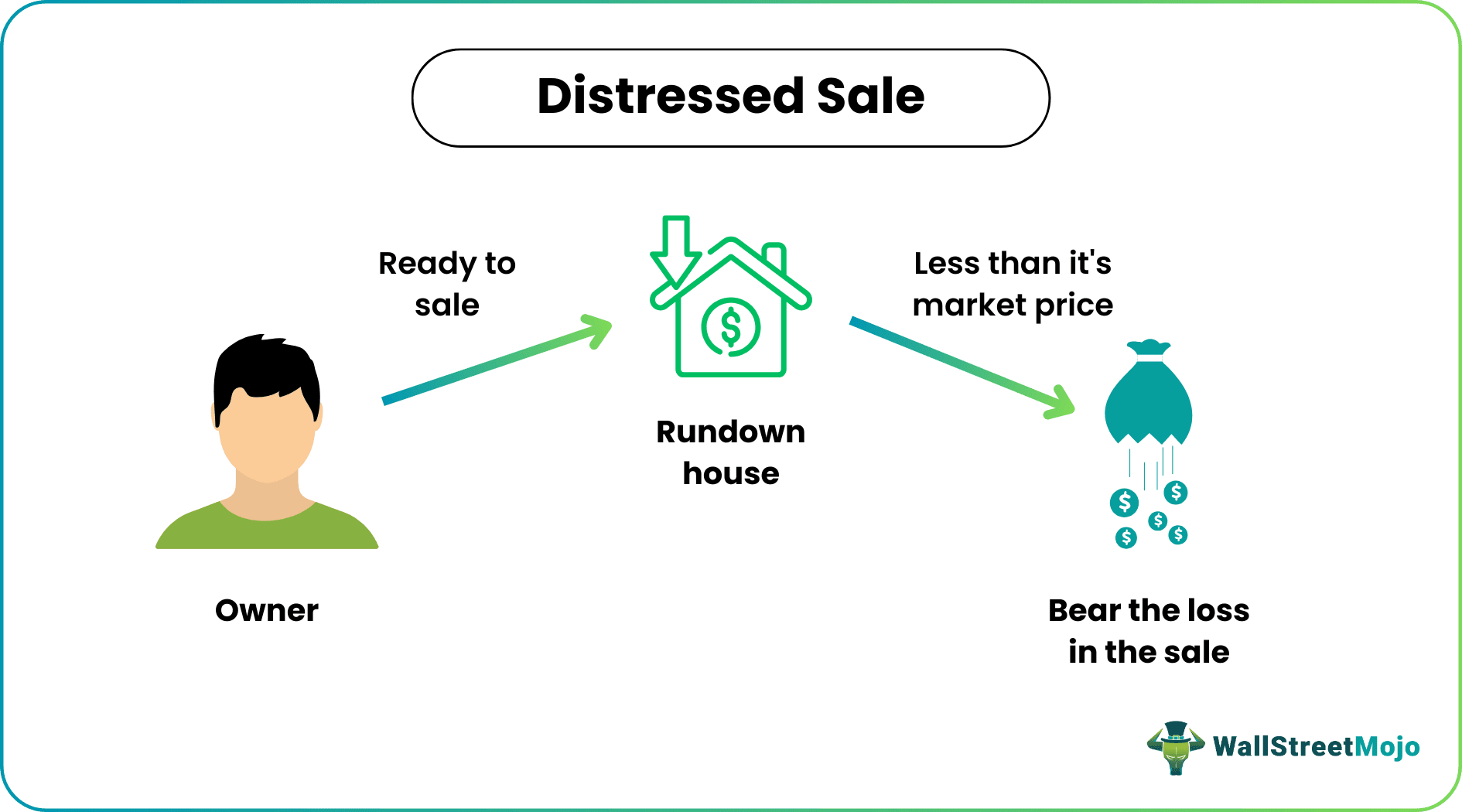Table Of Contents
Distressed Sale Meaning
A distressed sale is a sale transaction that involves the sale of an underlying asset valued below its intrinsic value. The asset owner is ready to sell the asset for a price less than market value and bear the loss to liquidate his investment immediately.
How Does Distress Sale Work?
Here we discuss how it works in various situations.
#1 - In Real Estate
The important thing to understand is the meaning of distressed assets, which is a distressed property in the case of real estate. A distressed property is an old, damaged, run-down property with broken structures and a damaged interior and not fit for end-use without significant renovation.
The seller of the distressed property agrees to sell the property to the buyer at a lower price. It majorly happens when the owner/ seller of the property does not have enough funds to renovate the property and might go through economic crises such as not being able to repay his debts or other financial emergencies. Thus, he sells the property at a lower price and bears the financial loss to liquidate his investment quickly.
On the other hand, the buyer of the property buys the distressed property for two reasons:
- For long term capital appreciation; or
- For trading the property at a profit
Suppose the buyer of the distressed property anticipates a significant price rise due to the development potential of the geographical location. In that case, the buyer may renovate the property and hold it as a long term investment.
Else, the buyer of the distressed property will acquire the property from the seller at a lower price, incur the cost of renovation to make the property fit for the end-user and then sell it to a new buyer at a profit. It is how distressed transactions happen in real estate.
#2 - In Business
Similar to real estate, distressed sale transactions can also be witnessed in the business case. A distressed business is a business that is consistently making losses or on the edge of winding up or insolvency.
The owner or seller of the business sells the business at a significantly lower price to liquidate the residual proceeds from the investments. Due to this, the seller incurs a financial loss by selling the business at a lower price. The buyer of the business buys it for two purposes:
- Suppose he anticipates that the business's product, service, or brand has significant potential to generate profit. In that case, he buys the business to continue it and make profits out of it.
- Else, he sells the parts of the business to get a better price than the price paid for the purchase of the business, which results in trading profit.
#3 - Stocks/Portfolios
Many times, investors short sell their stock portfolios. When a stock hits below the lowest bearable price or stop-loss point, the investor short sells their stocks even at a loss to protect their investment value from reaching zero.
Example of Distressed Sale
Distressed transactions are majorly evident in business and real estate transactions. For instance, a sale of a business that is consistently making losses and almost on the edge of winding up is an example of a distressed sale.
Or let us say another example is selling a run-down house for less than its market price, where the owner is ready to bear the loss in the sale.

Advantages
#1 - To Seller of Distressed Asset
The distressed sale provides a cushion to the maximum loss that the asset owner may incur. It is applicable in the scenarios where the asset price consistently falls (say stocks), and the owner of the asset continues to hold the asset in anticipation of the price rise. Though in the case of the sale of such assets, the seller bears the financial loss, the extent of the loss can be reduced by selling the asset immediately at a lower price instead of hoping for a better price.
Distressed sale transactions can be the possible exit strategy for the asset holder who is in urgent need of finances and ready to sell the asset to encash its price.
#2 - To Buyer of Distressed Asset
- Capital Appreciation: If the asset has the potential to outperform in the long run, that long-term capital gain can provide significant appreciation to the buyer on the money invested.
- Option to execute a profitable trade: The buyer of the distressed asset gets the property at the lower prices, and by trading the asset at a better price with the new buyer, he earns a trading profit on the asset.
Disadvantages of Distressed Sale
#1 - To Seller of Distressed Asset
The key disadvantage is that the seller is not limited to the extent of the loss he bears due to the asset's sale. The seller short-sells to encash the investment immediately to meet his financial needs and bear the opportunity loss of the capital appreciation the asset could have generated for a longer holding period.
#2 - To Buyer of Distressed Asset
The buyer's possible disadvantage of the distressed sale would be the wrong selection of assets or buying at the wrong price due to a lack of effective due diligence.
Conclusion
The distressed sale transaction involves the sale of the distressed assets generally at a lower price than its fair market value because the seller of the asset wants to liquidate his asset immediately.
